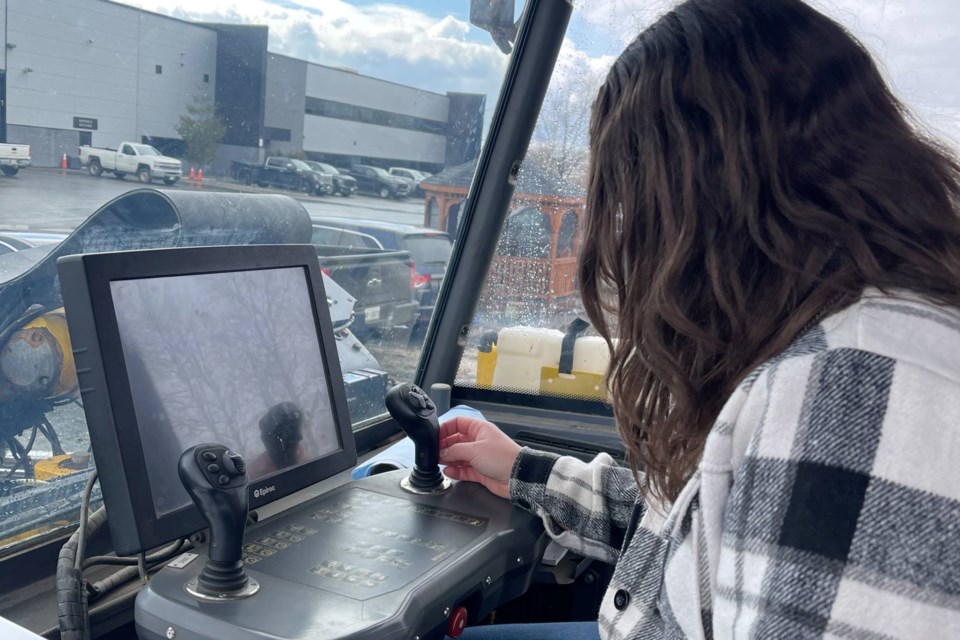A Sudbury-based tech startup is poised to make underground mining a bit safer.
Sofvie, Inc., recently teamed up with Cambrian College’s research division to test and refine an Internet of Things [IoT] device with a simple approach: streamline and manage employees’ training and safety certificates — which can number in the hundreds for each individual — and relay the information to supervisors before those operators take the helm.
Gus Minor, Sofvie’s chief innovation officer, said his integrated software is “a better calculated on switch” for heavy equipment, which will keep it from being used improperly, or dangerously, by unqualified operators.
That’s a huge boon for the safety-conscious mining industry.
“It's really management at scale,” Minor said. “It's a huge challenge when you're lining up your crews of 30 or 40 people to go in and do work, and making sure that every single person is trained for that task or that piece of equipment in real-time.”
It’s a current practice, Minor said, for employee certifications to be stored in a spreadsheet file, then printed out on paper while the project gets underway. The process can be clumsy, difficult to manage, slow to update, and may inevitably put uncertified workers in dangerous situations.
“Whether you work for a mining contractor or if you work for a mining company, when everything is flowing on paper, it's easy for things to get lost,” Minor said.
“When you go from workplace to workplace, manager to manager or supervisor or supervisor, it's easier for a file folder to be misplaced,” Minor said. “It becomes a cumbersome activity to understand who was qualified on what and for how long, and when's the last time you were able to use that equipment.”
Minor came by the idea for the new technology honestly — he cut his teeth in Sudbury’s underground mines, first as a jackleg stoper doing reconditioning and construction work, then working his way up to project superintendent.
He’s a third-generation miner, and has seen first-hand the dangers of the job, losing an uncle in a workplace death in the mid-80s, and watching the physical toll the job took on his grandfather, who died from cancer, and on his own father.
"[Mining's] really an industry of trial and error, so to speak," he said. "There's a lot of things that have been learned along the way and corrected and remediated so that we don't have any recurrence. But a lot of those rules were put in place because of a significant impact to a person's life."
The two-year development project is funded by the Government of Ontario through its Ontario Centre for Innovation’s (OCI) Voucher for Innovation and Productivity (VIP) program — an initiative that teams up industry specialists with academic researchers to solve real-world challenges.
Sofvie received $150,000 through the program, which they matched with their own funds,for a total project value of $300,000. The project will be based at Cambrian College’s Glencore Centre for Innovation, and is expected to employ four researchers and between six and 12 Cambrian students.
The technology, which will integrate into most equipment’s existing digital setup, will ensure only certified operators are controlling the machinery, including some of the larger pieces underground: scissor lifts, haulers, scoops and jumbo bolters.
“They're all fairly large pieces of equipment that are actually quite cumbersome to operate for the most part,” Minor said. “So, before you start kind of travelling down the mine, down on the ramp, or any of the levels in the mine site, you want to make sure that you're very comfortable and familiarized, and trained to operate it.”
“Not only for the safety of the equipment, but more specifically for the safety of the operator and the safety of others that are on the premises as well.”
If an operator attempts to use the equipment without the proper certifications of safety certificates, the machine will communicate with supervisors and simply not operate, Minor said.
“It’s an everyday challenge to stay on top of workers' training and understand where they are, and if there's anything expired to get them renewed, while also making sure that the work keeps moving forward," Minor said.
“Anything we can do to bridge that gap is going to be life-changing in the field.”



